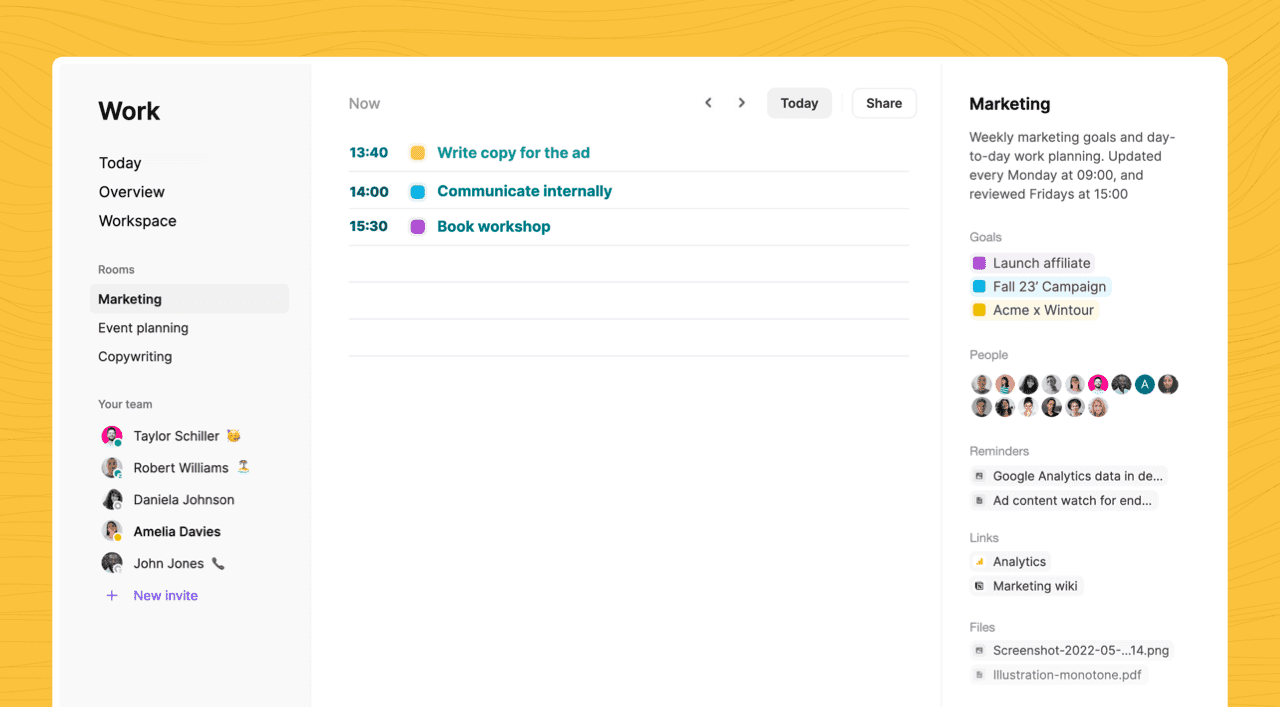Pembio
A curated collection of resources, worksheets and templates within the productivity space.
Get the app ✌️Golden rules of setting goals
It is necessary to have objectives in place to achieve success. Without goals, it is difficult to concentrate and more or less impossible to know that to focus on. Not only does goal-setting empower you to steer the course of your own life, but it also gives you a measure against which to evaluate whether or not you are genuinely making progress toward your objectives.
However, you must first understand how to define your objectives in order to reach them successfully. It is not enough to state, "I want" and anticipate that your request will be met. Defining goals requires first giving great attention to what you want to do, then putting in a lot of effort to accomplish those goals.

Why are rules important for setting goals?
Establishing goals for yourself is your first action to achieve success. It is far more challenging to keep one's focus and find one's bearings when one does not have objectives.
Not only does creating goals provide you with the capacity to steer the course that your life takes, but it also provides you with a yardstick by which you may determine whether or not you have achieved real success.
If you give yourself goals to work toward, you'll improve your ability to see the big picture and stay motivated over the near term. It helps you maximize the potential of your life by directing your efforts toward collecting knowledge, assisting you in managing your time and resources, and giving you the ability to do so.
It isn't easy to focus and find one's path when one does not have goals to pursue. Not only does the act of creating plans provide you the authority to direct the way that your own life takes, but it also provides you with a yardstick to determine whether or not you are making forward in the direction of the goals you have set for yourself.
Golden Rules
Set objectives to go ahead
The goals you set for yourself must serve as a source of motivation; this means that you have to ensure that the plans are meaningful to you and that there is something of value to be gained from accomplishing them.
The goals you set for yourself must serve as a source of motivation; dreams, however, serve as a source of inspiration. If you have little interest in the result or it appears insignificant, you're unlikely to make it happen. If you have little interest in the development, it seems minor, given the bigger picture.
Conversely, if you care about the outcome of your efforts to reach the goal, you boost the likelihood of getting there. The ability to maintain one's motivation throughout the procedure is a vital component in reaching the outcomes you strive for. So make sure your goals are driven by, and focused on, the aspects of your life that are most important to you.
If you’re not selective, you may end up with too many objectives and insufficient time for each. Reaching a goal requires dedication; therefore, to increase the possibility of success, it is necessary to have a feeling of immediacy and the mindset that "I must do this", which will be near impossible if you have too much on your plate and split your focus on too many things.
And when you’re not in a focused mindset, you will be tempted to put things off for a later time, which are in fact the very things you need to do to reach the goal at all. This is a problem because, clearly, putting things off leads to a loss of momentum and, ultimately, failure. And the more you fail, the more difficult it will be to become successful next time you set out to do something…

Set SMART Goals
SMART goals are probably not new to you, and you might already have some experience with the methodology. Planning goals according to the SMART method significantly increases the likelihood of you successfully reaching the goals, and it’s actually a quite simple process.
The SMART acronym stands for: specific, measurable, attainable, relevant, and time-bound. This means that when you define a goal, it needs to be: Specific → what exactly is it you want to achieve? Measurable → how will you know where you are in relation to reaching your goal? Attainable → make the goal ambitious, but realistic Relevant → only strive for goals that actually matter to you, your team and/or organization Time-bound → a goal needs to have a deadline by which it should be achieved
Record your objectives
Putting one's aspirations into writing pulls them into the present and makes them more actionable and clear. You’ll have fewer excuses to let things slip if you put things down on paper, and you’re more likely to remember the goal at all. When you are writing, it is essential that you use the term "will" rather than "would like to" or "may."
You should post a sign with your goals in a visible position so that you are continuously brought back to the topic of what you want to accomplish. Attaching them to your walls, desk, computer screen, bathroom mirror, or even refrigerator will be a constant reminder of their importance.
Develop a strategy for moving forward
When individuals set objectives for themselves, they often skip over this process. But if you’re just focused on the outcome, there is a risk that you’re appropriately preparing for the steps that need to be taken along the way.
So don’t just focus on the ultimate result. Also define and write down the various stages of the project and then cross them off one at a time as you complete them. Doing so will enable you to see the progress you’re making toward the overall goal you have set for yourself.
Maintain your forward momentum
Remember that goal planning is not the end, it’s actually just the first step and it is really an activity that should be done consistently in and of itself. Incorporate reminders into your routine to ensure that you stay on track, and arrange regular check-ins with yourself to discuss your accomplishments and plans.
Your ultimate goal may be the same over a longer period of time, but the action plan you create for yourself should most likely change as you go along. Check whether the need, value, and relevance are still substantial at regular intervals.
Conclusion
The process of creating goals requires the creation of an action plan that is intended to inspire and direct an individual or group toward the achievement of a specific objective. Instead of impulses and fleeting intentions, goals need more significant planning and organization. Therefore, if a person sets objectives for themselves, it indicates that they have dedicated their thoughts, feelings, and actions towards achieving those goals.
By: Johan Flodgren

The goal planning app that will skyrocket your productivity
A brand new productivity app - empowering you, or your entire team, to get the most important work done with stunningly simple goal planning.
Get started for free